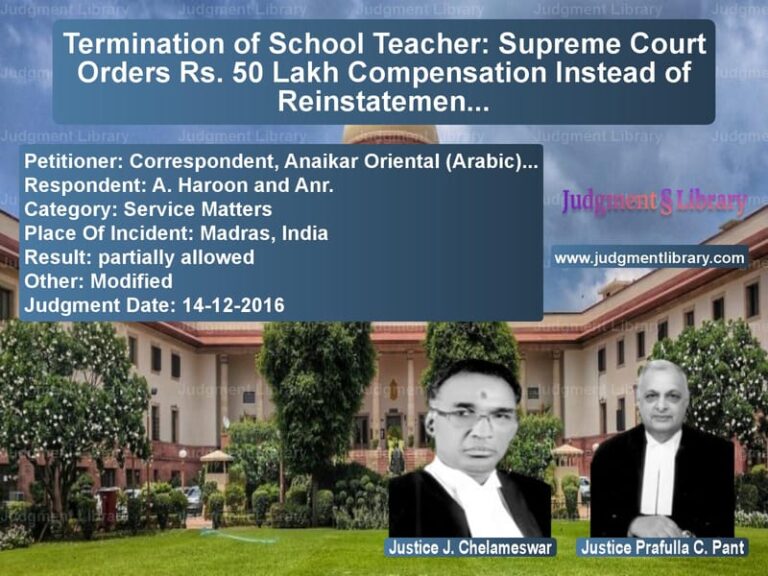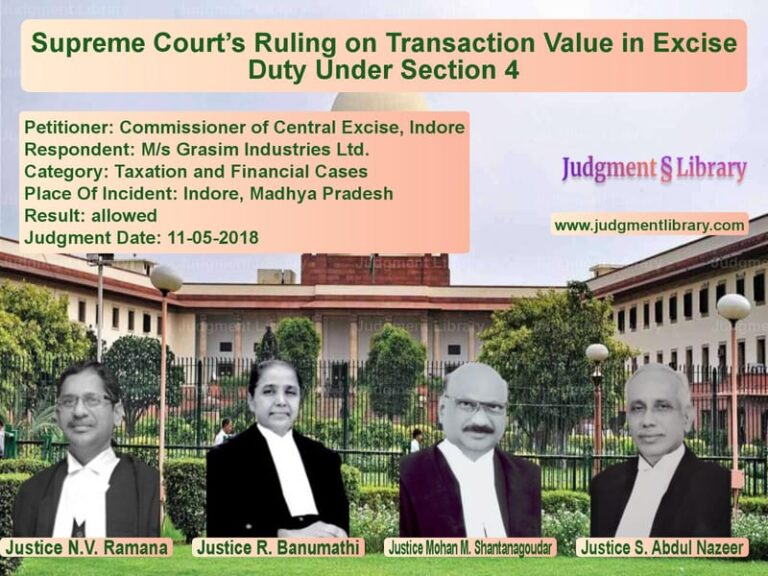Supreme Court Rules on Retrospective Application of Income Tax Amendment
The Supreme Court of India, in the case of Commissioner of Income Tax Kolkata XII v. M/s Calcutta Export Company, ruled that the amendment introduced by the Finance Act, 2010, to Section 40(a)(ia) of the Income Tax Act, 1961, has retrospective effect. The Court held that the amendment, which provides relief to taxpayers for delayed deposit of Tax Deducted at Source (TDS), should apply from the inception of the provision in 2005, rather than prospectively from 2010.
The judgment, delivered by a bench comprising R.K. Agrawal and Abhay Manohar Sapre, clarified that the amendment was curative in nature and intended to remedy unintended consequences caused by the original provision.
Background of the Case
The dispute arose when the Income Tax Department disallowed deductions claimed by M/s Calcutta Export Company for TDS deposited after the prescribed due date. The company had deducted tax at source and deposited it with the government, but after the financial year had ended. The department cited Section 40(a)(ia) of the Income Tax Act, which disallowed such deductions if the TDS was not deposited within the specified period.
The assessee challenged the disallowance, arguing that the amendment introduced in 2010, which allowed deductions for TDS deposited before the due date of filing returns, should be applied retrospectively. The High Court ruled in favor of the assessee, prompting the Income Tax Department to appeal before the Supreme Court.
Key Legal Issues
- Whether the amendment introduced by the Finance Act, 2010, to Section 40(a)(ia) applies retrospectively from 2005 or prospectively from 2010.
- Whether the amendment was curative in nature and intended to remove hardship faced by taxpayers.
- Whether the High Court correctly interpreted the purpose and effect of the amendment.
Arguments Presented
Petitioners’ Arguments (Income Tax Department)
The Income Tax Department contended:
- The amendment should be applied prospectively from 2010, as it was introduced by the Finance Act, 2010.
- Allowing retrospective application would create administrative complications and affect tax collection.
- The provision in its original form was designed to ensure timely compliance with TDS deposit requirements.
Respondents’ Arguments (M/s Calcutta Export Company)
The assessee countered:
- The amendment was introduced to remove hardship and should be applied retrospectively.
- The intent of the amendment was to ensure that genuine taxpayers were not penalized for late TDS deposits.
- The Finance Act, 2010, did not explicitly state that the amendment should apply prospectively.
Supreme Court’s Observations
Nature and Purpose of the Amendment
The Court analyzed the purpose of the amendment and ruled:
“The amendment introduced by the Finance Act, 2010, was intended to mitigate hardship and ensure fairness in tax compliance. It is, therefore, curative in nature and should be applied retrospectively from 2005.”
Impact on Taxpayers
The Court emphasized that the amendment prevents undue hardship:
“A taxpayer who has deducted TDS and deposited it before the due date of filing returns should not be penalized. The amendment ensures that the objective of tax compliance is met without imposing unnecessary restrictions.”
Legal Precedents
The Court referred to prior rulings on retrospective application of amendments:
“In cases where amendments are remedial and meant to remove hardship, they should be applied retrospectively unless expressly stated otherwise. The present amendment falls within this category.”
Final Judgment
The Supreme Court ruled in favor of the assessee:
- The amendment to Section 40(a)(ia) introduced by the Finance Act, 2010, applies retrospectively from 2005.
- The disallowance of deductions for late TDS deposits was set aside.
- The Income Tax Department was directed to allow deductions for TDS deposited before the due date of filing returns.
Implications of the Judgment
- The ruling provides relief to taxpayers who had faced disallowances due to late TDS deposits.
- It clarifies that remedial amendments should be applied retrospectively to serve their intended purpose.
- The decision ensures fairness in tax compliance and prevents undue hardship.
- The judgment may affect pending cases where similar disallowances have been challenged.
- The ruling reinforces the principle that tax laws should be interpreted in a manner that upholds equity and prevents unintended penalties.
This landmark judgment clarifies the retrospective application of tax amendments and ensures that taxpayers are not penalized for procedural delays in TDS deposits.
Petitioner Name: Commissioner of Income Tax Kolkata XII.Respondent Name: M/s Calcutta Export Company.Judgment By: Justice R.K. Agrawal, Justice Abhay Manohar Sapre.Place Of Incident: Kolkata.Judgment Date: 24-04-2018.
Don’t miss out on the full details! Download the complete judgment in PDF format below and gain valuable insights instantly!
Download Judgment: Commissioner of Inco vs Ms Calcutta Export Supreme Court of India Judgment Dated 24-04-2018.pdf
Direct Downlaod Judgment: Direct downlaod this Judgment
See all petitions in Income Tax Disputes
See all petitions in Tax Refund Disputes
See all petitions in GST Law
See all petitions in Judgment by R K Agrawal
See all petitions in Judgment by Abhay Manohar Sapre
See all petitions in dismissed
See all petitions in supreme court of India judgments April 2018
See all petitions in 2018 judgments
See all posts in Taxation and Financial Cases Category
See all allowed petitions in Taxation and Financial Cases Category
See all Dismissed petitions in Taxation and Financial Cases Category
See all partially allowed petitions in Taxation and Financial Cases Category







